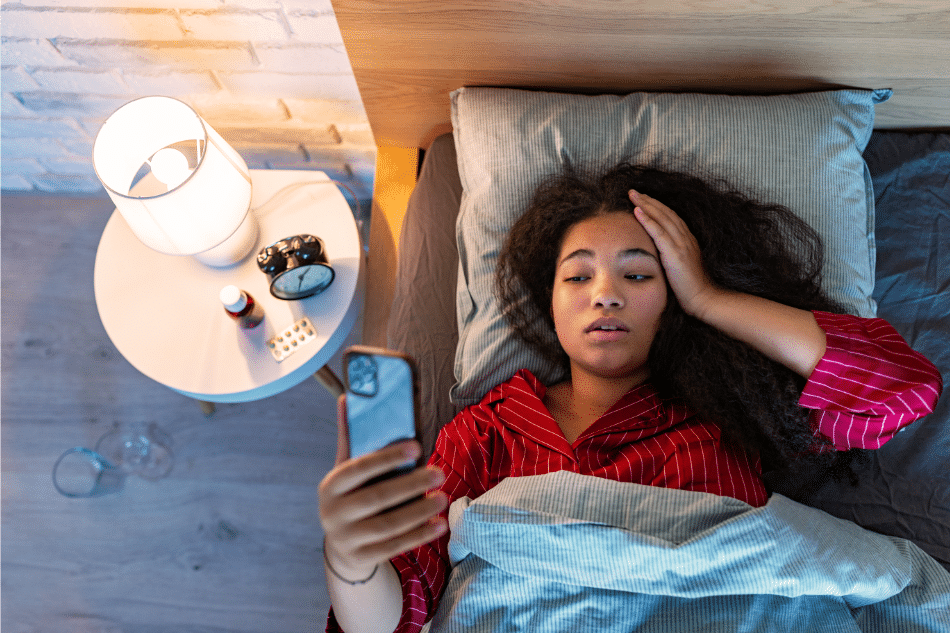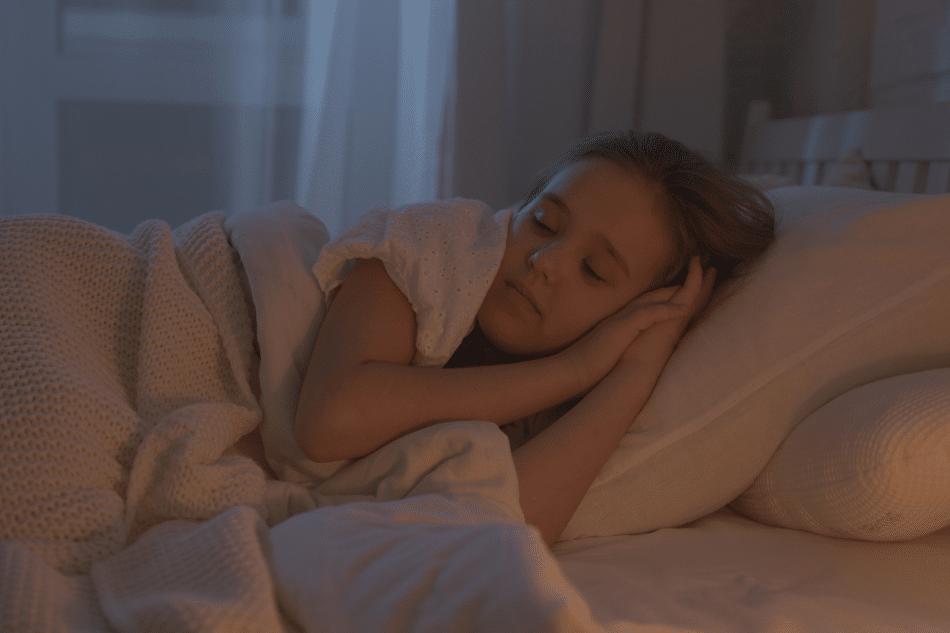Zolpidem (Ambien) for Adolescents: Does It Stop Insomnia?

Imagine flipping a switch in your mind that says “Right, let’s shut down for some rest” – even when your mind is racing and your phone buzzes (again), or you have a math test tomorrow that’s filling you with worry.
For a lot of teens with insomnia, that type of mental switch feels like it doesn’t exist. And the problem is: Trouble sleeping isn’t just annoying – it can impact your mood, academic work, and long-term health.
That’s where medication like zolpidem enters the ring. You might have heard about using zolpidem (Ambien) for sleep disorders in teenagers, but how does it work? Will it help you fall asleep super quickly? And is it safe?
On this page, we’ll unpack what the science says and what doctors recommend, and answer some burning questions you may have. Keep reading to find out if zolpidem will help you catch some z’s.

What Is Ambien?
Ambien is a medication that can help you sleep better. Ambien and zolpidem are the same, but you may be more familiar with the name “Ambien” as this is the brand name. Zolpidem is a type of medication called a non-benzodiazepine. It can be useful if you have trouble falling asleep or staying asleep, and can also help your muscles relax.1 It is only prescribed for short-term use, to remind your brain of what your sleep should really be like and reset your sleep schedule.
How Does Ambien Work?
In your brain, certain chemicals control whether you are asleep or awake. One of them is called GABA, which is like your brain’s natural “relax” signal – it tells your brain to slow down and rest. Zolpidem boosts the effects of GABA, meaning that your brain activity slows down even more, making you feel calm and drowsy. It’s a bit like hitting ‘sleep mode’ on your laptop.
During the daytime, your brain is like a computer with lots of programs running, like school, friends, worries, and TikTok. At night, your brain needs all of that to slow down to go to sleep. Zolpidem is like hitting the ‘sleep’ button on your laptop – it tells your brain to start closing the tabs so you can rest. But just like a computer in sleep mode, your brain isn’t completely turned off – it’s just sitting in a low-energy state so that it can recharge.
Zolpidem is approved by the U.S. Food and Drug Administration (FDA) for treating insomnia in adults, meaning it has been thoroughly tested to make sure it is safe and effective for use in adults with sleep problems. Its effectiveness in children and teens hasn’t been studied fully, so it should be used with caution and following doctor recommendations.
Your doctor may suggest using Ambien for teenage insomnia, especially if you’ve tried other ways to help your sleep – such as therapy, lifestyle changes, and sleep hygiene – and they haven’t been successful. In these instances, it’s safe to use zolpidem as a teen.
What Is It Used for in Teens?
Zolpidem is used to treat insomnia, which is when you have problems sleeping. Adolescents typically need eight to ten hours of sleep every night, yet over 70% of U.S. teenagers aren’t getting the sleep they need to recharge and reset.2,3 Sleep medications are one way to get quality sleep and rest time.
Ambien for Teen Anxiety and Sleep Disturbances
A busy school schedule, homework, friends, sports, other commitments…these can all build up as a tick list of things ‘to do’, and the pressures of trying to meet all the expectations can lead to worries and anxiety. It’s no wonder you can’t easily switch your brain off when you have so much on your plate.
This is why doctors sometimes prescribe zolpidem for teens with anxiety-induced sleep problems. Although it won’t cure the anxiety, it could help you get some quality sleep and help you rest.
Ambien for Depression-Related Sleep Disturbances in Teens
Depression and sleep problems are very closely linked.4 Depression can make your sleep worse, and poor sleep can worsen a person’s depression symptoms. It’s sometimes hard to know which came first, the depression or the sleep difficulties. In either case, getting quality sleep and resetting your sleep schedule can make a difference to how you feel. Although there hasn’t been a link found between Ambien and emotional regulation in teenagers, getting on top of your sleep can bring real improvements overall to how you feel during the day.
However, it’s important to remember that Zolpidem doesn’t actually fix the root cause of poor sleep – it just helps to start the process. If other challenges are causing you to lose sleep, like feeling sad or as though your mind is racing with worries, then these need to be looked at to help you sleep better in the long run. Using Ambien for managing stress-related sleep problems in teens can help with the sleep, but not with the stress. But sometimes, getting some rest can help you think more clearly and discover what may be causing you to sleep so poorly.
Ambien Dosage for Teenagers With Insomnia
Ambien comes as a tablet, in either 5 mg or 10 mg doses. Your doctor will decide what dosage to give you, as there aren’t currently recommendations for teens or children. However, adults usually start at 5 mg per night. It needs to be taken right before bedtime, at least seven or eight hours before you are due to wake up because of its sleep-inducing effect.5
Remember that this is a short-term medicine designed to give your sleep system a reset. Keep your doctor up-to-date with any changes and let them know whether you think Ambien is helping you to sleep. That way, your doctor will be able to personalize your dose based on your age and sleep issues.
Benefits of Zolpidem
Zolpidem for improving sleep in teens can be very effective at treating insomnia. It can help you fall asleep quickly, and to stay asleep for longer.6 This can leave you feeling rested and more able to cope with whatever the day brings.
Teenagers often get a sleep-cycle disturbance due to their changing hormones – meaning they don’t feel sleepy until a few hours later than usual. If you used to fall asleep at 9 pm, but are now wide awake until 11 pm, this could be the reason why. Puberty can literally turn you from an early bird to a night owl.7 Taking Ambien can give your brain’s sleep cycle a reset and remind it when the sleepy chemicals should be kicking in to help you sleep.
So now you know some of the benefits of taking zolpidem, let’s balance it out and look at some of the potential downsides.
Ambien Side Effects for Adolescents
Ambien, like all medications, comes with side effects. These are the unwanted effects that come along with taking medicine for the intended effect. They can be good, bad, or just plain annoying. Imagine you chug a big energy drink to stay awake for a late-night study session before an exam. It will help you stay alert, but it also means you won’t be able to sleep later and may feel a bit jittery and restless. In this case, the main intended effect was staying awake, but the side effects were feeling restless and not being able to sleep later.
Not everyone will get side effects from medication, but it’s good to know what they could be. The most common side effects of taking Ambien are:5
Sleepiness
- Dizziness
- Diarrhea
- Feeling groggy
These aren’t all of the side effects but are the most common ones. It’s important to let your doctor know if you experience unwanted side effects when you take Ambien, as they can adjust the dosage to help you cope, or can look at other options to help you sleep. Keeping track of how you feel is useful for this, whether you write it down on a Post-it note or an app on your phone.
Risks of Ambien Use in Teenagers
Just as you saw with the side effects, there can be downsides to taking medication. There are some other risks to know about when you take Ambien relating to your thoughts, behaviors, and other medicines. Let’s take a look at these now:5,8
Complex Sleep Behaviors: Getting out of bed when you’re not fully awake and doing things you won’t remember, such as sleepwalking, making or eating food, and talking on the phone.
- Medicine Interactions: Zolpidem can interact with other medicines and give bad side effects, so make sure you tell your doctor about all medicines you are taking, even vitamins or supplements.
- Abnormal Thoughts and Behaviors: Ambien can sometimes make you more aggressive than usual or cause hallucinations.
- Suicidal Thoughts: There is a risk that your depression can get worse or that you can have suicidal thoughts when taking zolpidem. If you think this is happening to you, contact your doctor and seek help immediately.
- Memory Loss: You may not remember things clearly when you first wake up, especially if you’ve had less than the eight hours of rest that Ambien gives you.
Stopping Ambien Safely for Adolescents
If you suddenly stop taking Ambien, you could get some unwanted effects, known as withdrawal symptoms. Ambien withdrawal symptoms in teens include:6
Muscle cramps
- Vomiting
- Sweating
- Feeling nervous
- Panic attacks
- Crying
- Problems sleeping
To avoid having withdrawal effects, it’s essential to talk with your doctor about stopping Ambien. They can help you create a plan so that you can avoid feeling these effects as much as possible.
Alternatives to Ambien
Ambien isn’t your only option when it comes to sleep aids – in fact, prescription medications are usually one of the last options to try. Let’s look at some other ways you can improve your sleep:
Create Healthy Sleep Habits: Having a bedtime routine is key for sleeping well. It helps you wind down and tells your brain and body it’s time to enter sleep mode. Set a sleep and wake time that allows you to get that important 8-10 hours of sleep each night, and stick to it. Reduce bright lights and screen time towards bedtime, avoid taking naps in the daytime, and give yourself a chance to relax by reading or listening to music in bed.9
- Therapy: Cognitive behavioral therapy for insomnia (CBT-I) can be just as effective as sleep medication at helping you sleep. It can help you to set a good sleep routine, tackle any underlying issues that are keeping you awake, and help you take control of your sleep.10
- Herbal Remedies: Some people find herbal remedies make them feel calm or relaxed, like the smell of lavender, or the taste of chamomile tea.
- Prescription Medications: Zolpidem isn’t the only medicine for sleep. Doctors may prescribe different types depending on your needs, such as sedative antidepressants, antipsychotics, or benzodiazepines. Each works differently to help you sleep – some help you relax, others target underlying anxiety.
Seeking Professional Support
If you’re struggling to sleep at night but you don’t know what to do about it, seeking professional support is the first step. At Mission Prep, we are ready to guide you through your options for getting a peaceful night’s sleep. We specialize in helping teens with their mental health, and we know how vital getting good quality sleep is. Whether you are looking for simple lifestyle changes, medication management, or therapy to address underlying issues, we can help you on your road to recovery.
We know that mental health affects everyone differently, and we provide a wide range of treatments to suit your individual needs. We offer everything from outpatient therapy to 24/7 residential treatment to help you work through your challenges, and we will create a completely personalized plan with you so that you can achieve your mental health goals.
We understand the cost of mental health treatment can be a concern for families, and we have a range of payment options to make treatment as accessible as possible, including insurance, private pay, and finance plans.
If you’re ready to take your first step toward mental well-being, contact us today to start your healing journey.

References
- Bouchette, D., Akhondi, H., Patel, P., & Quick, J. (2024, February 29). Zolpidem. StatPearls – NCBI Bookshelf. https://www.ncbi.nlm.nih.gov/books/NBK442008/
- FastStats: Sleep in high school students. (2024, May 15). Sleep. https://www.cdc.gov/sleep/data-research/facts-stats/high-school-students-sleep-facts-and-stats.html
- Jenco, M. (2016, June 13). AAP endorses new recommendations on sleep times. American Academy of Pediatrics. https://publications.aap.org/aapnews/news/6630/AAP-endorses-new-recommendations-on-sleep-times
- Treating sleep problems may help prevent depression. (n.d.). https://www.psychiatry.org/news-room/apa-blogs/treating-sleep-problems-may-prevent-depression
- sanofi-aventis U.S. LLC. (1992). HIGHLIGHTS OF PRESCRIBING INFORMATION [Prescribing information]. https://www.accessdata.fda.gov/drugsatfda_docs/label/2022/019908s40s044s047lbl.pdf
- University of Illinois. (2021, March 3). Zolpidem, oral tablet. Healthline. https://www.healthline.com/health/drugs/zolpidem-oral-tablet
- Suni, E. (2023, October 4). Teens and sleep. Sleep Foundation. https://www.sleepfoundation.org/teens-and-sleep
- Research, C. F. D. E. A. (2022, February 18). FDA adds Boxed Warning for risk of serious injuries caused by sleepwalking with certain prescription insomnia medicines. U.S. Food And Drug Administration. https://www.fda.gov/drugs/drug-safety-and-availability/fda-adds-boxed-warning-risk-serious-injuries-caused-sleepwalking-certain-prescription-insomnia
- American Psychiatric Association. (n.d.). What are sleep disorders? https://www.psychiatry.org/patients-families/sleep-disorders/what-are-sleep-disorders
- Rossman, J. (2019). Cognitive-behavioral therapy for insomnia: An effective and underutilized treatment for insomnia. American Journal of Lifestyle Medicine, 13(6), 544–547. https://doi.org/10.1177/1559827619867677













